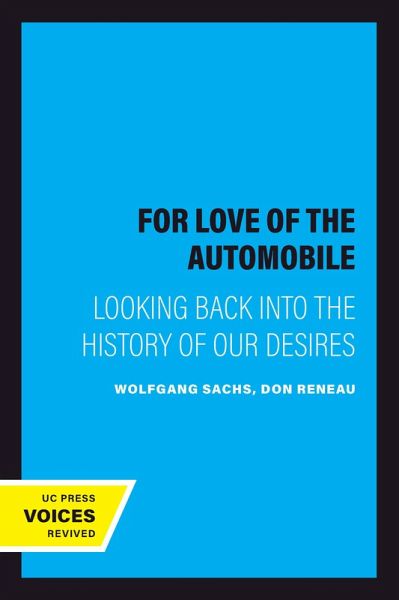
For Love of the Automobile (eBook, ePUB)
Looking Back into the History of Our Desires

PAYBACK Punkte
23 °P sammeln!
In his cultural analysis of the motor car in Germany, Wolfgang Sachs starts from the assumption that the automobile is more than a means of transportation and that its history cannot be understood merely as a triumphant march of technological innovation. Instead, Sachs examines the history of the automobile from the late 1880s until today for evidence on the nature of dreams and desires embedded in modern culture. Written in a lively style and illustrated by a wealth of cartoons, advertisements, newspaper stories, and propaganda, this book explores the nature of Germany's love affair with the ...
In his cultural analysis of the motor car in Germany, Wolfgang Sachs starts from the assumption that the automobile is more than a means of transportation and that its history cannot be understood merely as a triumphant march of technological innovation. Instead, Sachs examines the history of the automobile from the late 1880s until today for evidence on the nature of dreams and desires embedded in modern culture. Written in a lively style and illustrated by a wealth of cartoons, advertisements, newspaper stories, and propaganda, this book explores the nature of Germany's love affair with the automobile. A "history of our desires" for speed, wealth, violence, glamour, progress, and power-as refracted through images of the automobile-it is at once fascinating and provocative.
Sachs recounts the development of the automobile industry and the impact on German society of the marketing and promotion of the motor car. As cars became more affordable and more common after World War II, advertisers fanned the competition for status, refining their techniques as ownership became ever more widespread.
Sachs concludes by demonstrating that the triumphal procession of private motorization has in fact become an intrusion. The grand dreams once attached to the automobile have aged. Sachs appeals for the cultivation of new dreams born of the futility of the old ones, dreams of "a society liberated from progress," in which location, distance, and speed are reconceived in more appropriately humane dimensions.
In his cultural analysis of the motor car in Germany, Wolfgang Sachs starts from the assumption that the automobile is more than a means of transportation and that its history cannot be understood merely as a triumphant march of technological innovation.
Sachs recounts the development of the automobile industry and the impact on German society of the marketing and promotion of the motor car. As cars became more affordable and more common after World War II, advertisers fanned the competition for status, refining their techniques as ownership became ever more widespread.
Sachs concludes by demonstrating that the triumphal procession of private motorization has in fact become an intrusion. The grand dreams once attached to the automobile have aged. Sachs appeals for the cultivation of new dreams born of the futility of the old ones, dreams of "a society liberated from progress," in which location, distance, and speed are reconceived in more appropriately humane dimensions.
In his cultural analysis of the motor car in Germany, Wolfgang Sachs starts from the assumption that the automobile is more than a means of transportation and that its history cannot be understood merely as a triumphant march of technological innovation.
Dieser Download kann aus rechtlichen Gründen nur mit Rechnungsadresse in A, D ausgeliefert werden.













